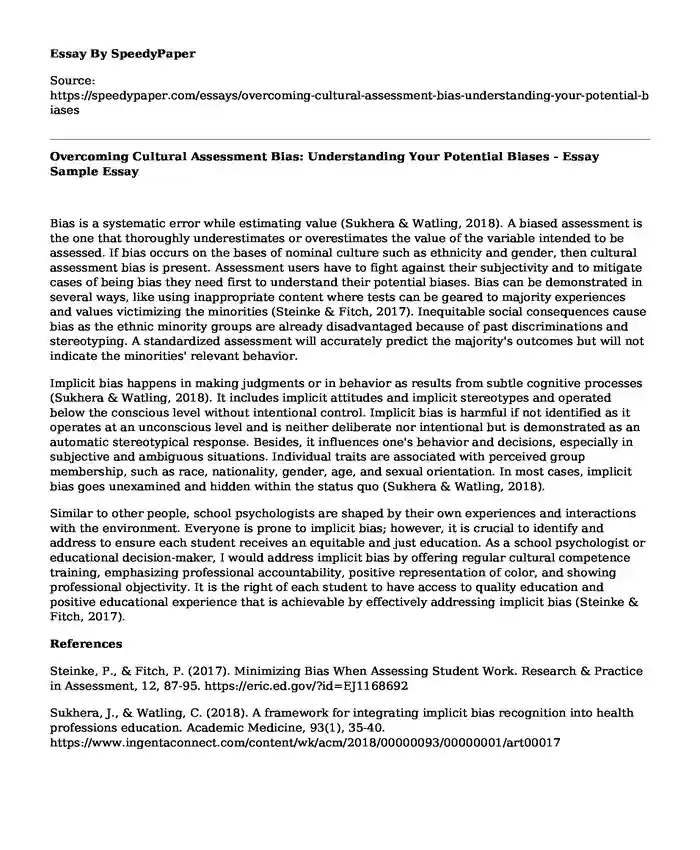Bias is a systematic error while estimating value (Sukhera & Watling, 2018). A biased assessment is the one that thoroughly underestimates or overestimates the value of the variable intended to be assessed. If bias occurs on the bases of nominal culture such as ethnicity and gender, then cultural assessment bias is present. Assessment users have to fight against their subjectivity and to mitigate cases of being bias they need first to understand their potential biases. Bias can be demonstrated in several ways, like using inappropriate content where tests can be geared to majority experiences and values victimizing the minorities (Steinke & Fitch, 2017). Inequitable social consequences cause bias as the ethnic minority groups are already disadvantaged because of past discriminations and stereotyping. A standardized assessment will accurately predict the majority's outcomes but will not indicate the minorities' relevant behavior.
Implicit bias happens in making judgments or in behavior as results from subtle cognitive processes (Sukhera & Watling, 2018). It includes implicit attitudes and implicit stereotypes and operated below the conscious level without intentional control. Implicit bias is harmful if not identified as it operates at an unconscious level and is neither deliberate nor intentional but is demonstrated as an automatic stereotypical response. Besides, it influences one's behavior and decisions, especially in subjective and ambiguous situations. Individual traits are associated with perceived group membership, such as race, nationality, gender, age, and sexual orientation. In most cases, implicit bias goes unexamined and hidden within the status quo (Sukhera & Watling, 2018).
Similar to other people, school psychologists are shaped by their own experiences and interactions with the environment. Everyone is prone to implicit bias; however, it is crucial to identify and address to ensure each student receives an equitable and just education. As a school psychologist or educational decision-maker, I would address implicit bias by offering regular cultural competence training, emphasizing professional accountability, positive representation of color, and showing professional objectivity. It is the right of each student to have access to quality education and positive educational experience that is achievable by effectively addressing implicit bias (Steinke & Fitch, 2017).
References
Steinke, P., & Fitch, P. (2017). Minimizing Bias When Assessing Student Work. Research & Practice in Assessment, 12, 87-95. https://eric.ed.gov/?id=EJ1168692
Sukhera, J., & Watling, C. (2018). A framework for integrating implicit bias recognition into health professions education. Academic Medicine, 93(1), 35-40. https://www.ingentaconnect.com/content/wk/acm/2018/00000093/00000001/art00017
Cite this page
Overcoming Cultural Assessment Bias: Understanding Your Potential Biases - Essay Sample. (2023, Nov 30). Retrieved from https://speedypaper.com/essays/overcoming-cultural-assessment-bias-understanding-your-potential-biases
Request Removal
If you are the original author of this essay and no longer wish to have it published on the SpeedyPaper website, please click below to request its removal:
- Life Changing Experience Essay Example
- Sociology Essay Example: Major Theoretical Perspectives in Sociology
- Literature Review Essay Sample on BOMB: The Race to Build and Steal
- Leadership Essay Example - Learning Diversity
- Essay Sample on Slavery and the American Political History
- Essay Example: African American Oppression and Their Disadvantages in Today's Time
- Paper Example: The Patient's Behavior Change
Popular categories





